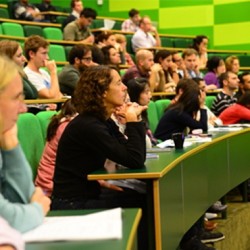By Helen Figueira
September 26, 2012
Time to read: 3 minutes
 Institute-wide event showcases CSC science
Institute-wide event showcases CSC science
The laboratories of the MRC Clinical Sciences Centre house an impressive and broad range of biomedical research. The annual CSC retreat offers an overview of current progress. Across two days, 12 senior CSC scientists presented their work covering everything from the role of cellular metabolism in obesity to cohesin SUMOylation in DNA repair. The talks were complemented by a poster session featuring work by the CSC’s PhD students.
This year’s retreat gave attendees the chance to learn about there search of two newcomers to the CSC; Jaya Krishnan (Epigenetic Regulation of Metabolism) and Irene Miguel-Aliaga Gut Signalling and Metabolism). Krishnan studies pathological cardiac hypertrophy, and spoke about the metabolic reprogramming associated with this disorder. Miguel-Aliaga is interested in crosstalk between the nervous system and digestive tract, and explained how she uses the fruit fly to find novel mechanisms relevant to humans:
“In adult flies, exposure to a nutritionally imbalanced diet for a week– the equivalent of a human eating lots of cake for a long time – leads to irreversible increases in tracheal branches [akin to human blood vessels].” Changes to the gut vasculature were permanent, so even after the diet was returned to normal, the damage was done. Miguel-Aliaga went on to consider the neurobiology that might explain these changes,commenting that “it would be interesting to see if neurons that couple nutritional state to gut vasculature are conserved in mammals”.
Moving up the food chain from flies to humans, Oliver Howes (Psychiatric Imaging) discussed his studies of patients with psychosis:“Psychotic disorders are very common, with a prevalence of one in a hundred, so in this lecture theatre there would be 1 or 2,” he warned.Questioning the use of animal models in psychosis research, Howes presented his findings on dopamine production in psychosis patients.The results he uncovered led him to conclude: “perhaps we should think of schizophrenia in the way we think of diabetes, with different types of biology. This may lead to the development of better drugs.”
From hearts and minds to guts and nerves – these represent just a taste of the variety of research presented at this year’s retreat. There were also talks on in vivo imaging with FRET biosensors, stem cell reprogramming, DNA replication and the regulation of vertebrate promoters; not to mention the many topics covered in over thirty posters presented by CSC’s PhD students. The event concluded with the presentation of the Rosa Beddington Prize for best poster, which went to Sadaf Khan (Cell Proliferation) for her poster on a genetic screen for a regulator of senescence.
This time next year CSC students will once again stand by their posters and group heads will take to the stage, to continue the stories they presented and discuss new avenues of research.
-AL, LF